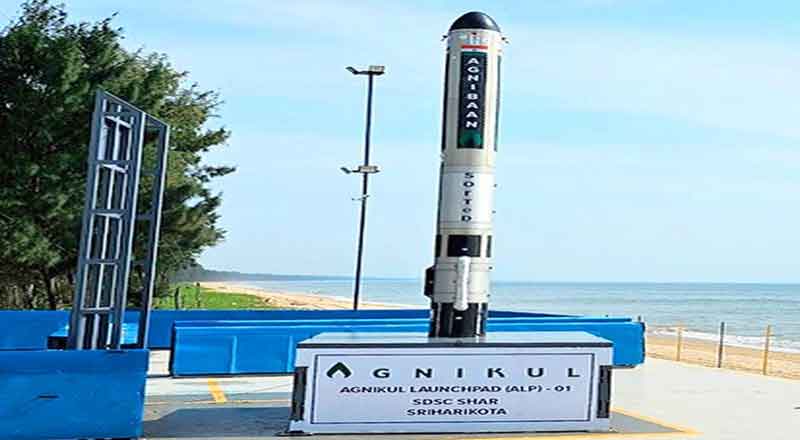- The Chennai-based space startup achieved a historic milestone by successfully launching its first rocket, the Agnibaan Sub Orbital Technology Demonstrator (SOrTeD).
- The journey to success was fraught with challenges, as AgniKul faced setbacks in its earlier attempts to launch the Agnibaan rocket due to technical glitches.
- The successful launch of the Agnibaan rocket catapulted AgniKul into the annals of space exploration history, making it India’s second private entity to accomplish such a feat.
- On Thursday, jubilation erupted at AgniKul Cosmos headquarters as the Agnibaan rocket soared into the sky, propelled by the world’s first single-piece 3D-printed rocket engine.
- The development and successful launch of the Agnibaan rocket represent a series of pioneering achievements in India’s space exploration endeavors.
- Furthermore, Thursday’s launch witnessed another historic milestone with the deployment of the Agnibaan rocket from India’s first private launchpad, Dhanush, at Sriharikota.
Persistence, they say, is key to success. And Chennai-based space startup AgniKul Cosmos Private Limited epitomized this ethos on Thursday (30 May) when it finally achieved a historic milestone by successfully launching its first rocket, the Agnibaan Sub Orbital Technology Demonstrator (SOrTeD), after four previous aborted attempts.
Thursday’s triumph marked the culmination of AgniKul’s unwavering determination, resilience, and technological prowess. It signified a significant breakthrough in India’s burgeoning private space sector and underscored the potential of indigenous innovation in reshaping the country’s space exploration landscape.
The journey to success was fraught with challenges, as AgniKul faced setbacks in its earlier attempts to launch the Agnibaan rocket due to technical glitches. Despite encountering hurdles, the company remained undeterred, showcasing a commendable spirit of perseverance and resolve.
The significance of AgniKul’s achievement cannot be overstated. The successful launch of the Agnibaan rocket catapulted AgniKul into the annals of space exploration history, making it India’s second private entity to accomplish such a feat. Skyroot Aerospace had previously achieved a similar milestone with the launch of the Vikram S in November 2022.
At 7:15 am on Thursday, jubilation erupted at AgniKul Cosmos headquarters as the Agnibaan rocket soared into the sky, propelled by the world’s first single-piece 3D-printed rocket engine. This remarkable technological feat garnered praise and accolades from across the spectrum, including from the Indian Space Research Organisation (ISRO) and Prime Minister Narendra Modi himself.
Srinath Ravichandran, co-founder and CEO of AgniKul Cosmos, expressed his gratitude for the unwavering support received from IN-SPACe and ISRO in realizing the company’s vision of designing and building original space-worthy hardware in India.
The Agnibaan rocket, weighing 575 kg and measuring 6.2 meters in length, is described as a customizable two-stage launch vehicle capable of carrying payloads weighing up to 300 kg to orbits nearly 700 km in altitude. Central to its design is the patented Agnilet engine, an entirely 3D-printed, single-piece, 6 kN semi-cryogenic engine, which utilizes sub-cooled oxygen as fuel.
The development and successful launch of the Agnibaan rocket represent a series of pioneering achievements in India’s space exploration endeavors. Notably, it marks the country’s first semi-cryogenic engine-powered rocket launch, a feat unprecedented in the history of Indian space exploration.
Girish Linganna, a space expert, underscored the significance of the mission, highlighting the innovative use of semi-cryogenic engine technology and the ground-breaking nature of the Agnilet engine, which is the world’s first single-piece 3D-printed engine.
Furthermore, Thursday’s launch witnessed another historic milestone with the deployment of the Agnibaan rocket from India’s first private launchpad, Dhanush, at Sriharikota. This achievement underscores India’s emergence as a formidable player in the global space arena and showcases the remarkable capabilities of its burgeoning private space sector.
Dr. Pawan Goenka, chairman of IN-SPACe, lauded AgniKul for its trailblazing accomplishments, while Lt Gen AK Bhatt (retired), Director General of the Indian Space Association (ISpA), hailed the launch as a watershed moment in India’s space exploration journey.
In summation, AgniKul Cosmos’ successful launch of the Agnibaan rocket after four attempts stands as a testament to the indomitable spirit of innovation, perseverance, and collaboration driving India’s space sector forward. It heralds a new era of indigenous space exploration and reaffirms India’s position as a global leader in space technology and innovation.
With this ground-breaking achievement, AgniKul Cosmos has not only etched its name in the annals of space history but also inspired a generation of aspiring scientists and engineers to dream big and reach for the stars. As India embarks on its journey towards the final frontier, AgniKul Cosmos emerges as a shining beacon of ingenuity, determination, and the limitless potential of Indian entrepreneurship in conquering the cosmos.
(With inputs from agencies)





